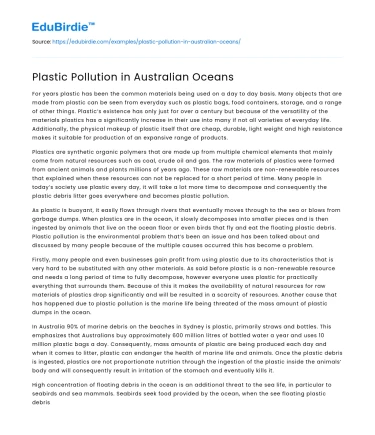Introduction
Plastic pollution has emerged as a critical environmental issue, particularly in marine ecosystems. The vast oceans surrounding Australia are not immune to this crisis. The Great Barrier Reef, renowned for its biodiversity, and other marine habitats are increasingly threatened by the influx of plastic waste. According to the Commonwealth Scientific and Industrial Research Organisation (CSIRO), approximately 130,000 tonnes of plastic find their way into Australian waterways annually. This pollution affects marine life, disrupts food chains, and poses risks to human health through seafood consumption. While global initiatives are underway to mitigate plastic pollution, Australia's unique marine environment demands tailored strategies. This essay will explore the extent of plastic pollution in Australian oceans, its impact on marine ecosystems, and the measures necessary to combat this growing threat.
Extent of Plastic Pollution in Australian Oceans
The scope of plastic pollution in Australian oceans is vast and multifaceted. A study by the University of Tasmania highlights that microplastics have been detected in even the most remote areas of the Southern Ocean. These findings indicate that ocean currents distribute plastic debris far from its original sources, complicating efforts to pinpoint and mitigate pollution origins. Furthermore, the majority of marine plastic originates from land-based sources, including urban runoff, illegal dumping, and mismanaged waste disposal systems. As Australia is an island nation with extensive coastlines, it is particularly vulnerable to the accumulation of marine debris.
The impact of plastic on marine life is profound. Marine animals, such as sea turtles, seabirds, and fish, often mistake plastic debris for food, leading to ingestion and, in many cases, death. A report from the Australian Marine Conservation Society reveals that over 30% of marine turtles in Australian waters have ingested plastic. Such ingestion can result in internal injuries, intestinal blockage, and starvation. Additionally, plastics can act as vectors for toxic substances, further endangering marine organisms. This contamination can work its way up the food chain, ultimately affecting human consumers of seafood.
Impact on Marine Ecosystems and Human Health
Beyond the immediate physical threats to marine life, plastic pollution has broader implications for marine ecosystems and human health. The deterioration of ecosystems such as coral reefs, seagrass beds, and mangroves due to plastic debris can lead to the loss of biodiversity. These habitats are crucial for the spawning and nurturing of numerous marine species. A degraded ecosystem can no longer support the same diversity and abundance of life, leading to cascading effects throughout the food web.
Human health is also at risk due to the bioaccumulation of toxins associated with plastics. According to a study published in the journal Environmental Science & Technology, microplastics can absorb and concentrate harmful chemicals, which can then be ingested by marine organisms and enter the human food supply. There is growing concern about the potential health effects of consuming seafood contaminated with microplastics and associated toxins, though research is ongoing in this area.
Addressing counter-arguments, some may argue that the economic cost of reducing plastic use and improving waste management systems could be prohibitive. However, the long-term environmental and health costs of inaction far outweigh the initial investments required for sustainable solutions. Implementing effective waste management practices and promoting alternative materials can stimulate economic growth through the creation of green jobs and industries.
Mitigation Strategies and Policy Recommendations
To effectively combat plastic pollution in Australian oceans, a multifaceted approach is necessary. This includes improving waste management infrastructure, implementing stricter regulations on plastic production and use, and enhancing public awareness campaigns. The Australian government has made strides with initiatives like the National Waste Policy Action Plan, which aims to reduce plastic waste through recycling and recovery efforts. However, more ambitious measures are required to achieve significant progress.
Encouraging innovation in biodegradable materials and investing in research to develop sustainable alternatives to plastic are crucial steps. Moreover, international collaboration is essential, as oceanic plastic pollution is a global problem that transcends national borders. Partnerships with neighboring countries and active participation in global agreements like the Ocean Plastics Charter can amplify the effectiveness of local efforts.
Public engagement is equally important. Educational programs that highlight the impact of plastic pollution and promote responsible consumer behavior can lead to cultural shifts away from single-use plastics. Community clean-up initiatives and citizen science projects can empower individuals to contribute to solutions, fostering a sense of collective responsibility.
Conclusion
Plastic pollution in Australian oceans presents a significant challenge that demands urgent attention and action. The complex interplay between environmental, economic, and social factors necessitates a comprehensive approach to mitigation. By enhancing waste management systems, promoting sustainable alternatives, and fostering international cooperation, Australia can lead by example in addressing this global crisis. As research and awareness continue to grow, it is imperative that policymakers, industry leaders, and the public work together to protect marine ecosystems and ensure a sustainable future for both the environment and human health. The time to act is now, for the health of our oceans and the generations to come.






 Stuck on your essay?
Stuck on your essay?

